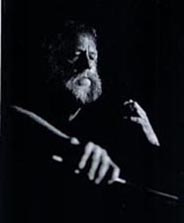 |
 Richard Hartshorne, Double Bassist, Nelson Richard Hartshorne, Double Bassist, Nelson
Richard Hartshorne, also known as “Dobbs,” was born in Lincoln, NE and began his formal bass studies at age 17. Within three months, he was accepted at Oberlin Conservatory and within three years, was playing in the American Symphony Orchestra. Hartshorne’s devotion to the Bach Suites began in 1967 at Juilliard when he purchased a Barenreiter edition. He has transcribed the Suites because he was captivated by the desire to play the suites so they sounded as if they were written for the bass. He has subsequently gained an international reputation playing them. In June 2002, he was invited to perform all the Suites at a June, 2002 concert at the Verbal Arts Center in Derry, Northern Ireland.
After graduation from Juilliard, Hartshorne joined the Peace Corps and traveled throughout Latin America. Soon after, he became a member of the National Symphony and taught at the National Conservatory. He has been the primary bassist with the Apple Hill Chamber Players for 30 years.
As a full-time chamber musician, he performed and expanded the repertoire for bass, encouraging composers Jon Deak, George Tzantakis, Tyson Street, Neely Bruce, John Steinmetz, and Dexter Morrill to write works that include bass. He has transcribed many works, with the bass substitution bringing a different sound and quality to a familiar work.
Extensive experimentation with scordatura, non-standard, tunings of the bass, as well as using different basses with distinct scordatura tunings, allow him to achieve the ringing, free chords Bach indicated in writing one of the first pieces to exploit the violoncello as a solo instrument.
When Apple Hill Chamber Players began their Playing for Peace initiative in 1992, traveling to countries in conflict, he included a solo comedic work on every program. He began to have his scripts translated and learned to perform them in Hebrew and Arabic. Audience enthusiasm shaped his choice of material and his gift of mimicry has enabled him perform his comic pieces to Polish, Turkish, Armenian, Azeri, Georgian, Mandarin and Egyptian audiences in their own languages and dialects.
“I believe in performing for under-served audiences… there is a special place in my heart for performances in prisons, jails, and juvenile detention centers,” explains Hartshorne. “I can feel a kind of quieting in the room, a draining of tension, and even though it’s not the kind of music they may be used to, I feel them moved by it. It is very important for children to grasp that music is not just a product to be consumed, but a vehicle for self expression.”

For more information visit
http://bachwithverse.org/
Back
to 2006 Fellows page
Last
updated:
October 25, 2005
|
|

